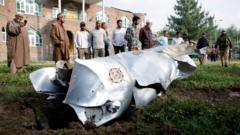Rising tensions between India and Pakistan are becoming increasingly alarming, marked by military engagements that threaten to spiral out of control.
**Escalating Tensions: India-Pakistan Conflict Reaches Critical Levels**

**Escalating Tensions: India-Pakistan Conflict Reaches Critical Levels**
As military strikes and civilian casualties increase, fears of a larger conflict loom over the region.
Since the recent terrorist attack in Kashmir, military operations have intensified between India and Pakistan, with both sides launching targeted strikes well beyond their disputed territory. Reports indicate severe military activity, including drone usage and airstrikes, leading to civilian casualties on both sides.
Bengaluru, India — Thousands have been displaced from conflict zones. Heavy shelling has transformed towns into ghostly afflictions while hospitals are overwhelmed with casualties. Eyewitness accounts in Jammu and Kashmir indicate the ongoing bombardment has reached unprecedented levels, evoking memories of previous wars. In the light of this escalating situation, families are stocking up on essentials, revealing a palpable panic that echoes across the border.
Rawalpindi, Pakistan — Corresponding retaliatory measures have seen Pakistan's military deploying drones against Indian positions, igniting fears that new levels of aggression could escalate into a full-scale war. The Indian army has claimed to intercept these aerial threats but the reliability of these reports remains disputed, adding layers of uncertainty to the unfolding crisis.
Srinagar, India — Civilians in conflict areas are bearing the brunt of military actions, with unverified casualty reports emerging daily. The local population, already frayed, faces darkness as blackouts ripple through affected districts in an attempt to thwart potential aerial attacks. This climate of fear is compounded by misguided information and propaganda permeating both nations' media environments.
"People are terrified; markets have closed, and the atmosphere is tense," noted a local shopkeeper from Jammu. "Our community has never witnessed anything like this since the last significant conflict with Pakistan."
Amidst ongoing military confrontations, diplomatic channels remain active as leaders from regional powers discuss urgent de-escalation. Efforts to alleviate the burden on civilians while addressing national security concerns appear critical to restoring stability. However, the prospect of international intervention or mediation, amidst rising nationalism, remains murky.
As the clashes continue, discussions of the international implications of the treaty governing the waters in the disputed territories have resurfaced. Water rights are pivotal, with both nations recognizing their economic dependence on shared resources, yet as tensions flare, there are increasing calls from Pakistan for a review of these historical agreements.
If the cycle of violence is not broken, the subdued yet significant fear of a major conflict looms over both nations, echoing the dark history that has marked their fraught relationship for decades.
Bengaluru, India — Thousands have been displaced from conflict zones. Heavy shelling has transformed towns into ghostly afflictions while hospitals are overwhelmed with casualties. Eyewitness accounts in Jammu and Kashmir indicate the ongoing bombardment has reached unprecedented levels, evoking memories of previous wars. In the light of this escalating situation, families are stocking up on essentials, revealing a palpable panic that echoes across the border.
Rawalpindi, Pakistan — Corresponding retaliatory measures have seen Pakistan's military deploying drones against Indian positions, igniting fears that new levels of aggression could escalate into a full-scale war. The Indian army has claimed to intercept these aerial threats but the reliability of these reports remains disputed, adding layers of uncertainty to the unfolding crisis.
Srinagar, India — Civilians in conflict areas are bearing the brunt of military actions, with unverified casualty reports emerging daily. The local population, already frayed, faces darkness as blackouts ripple through affected districts in an attempt to thwart potential aerial attacks. This climate of fear is compounded by misguided information and propaganda permeating both nations' media environments.
"People are terrified; markets have closed, and the atmosphere is tense," noted a local shopkeeper from Jammu. "Our community has never witnessed anything like this since the last significant conflict with Pakistan."
Amidst ongoing military confrontations, diplomatic channels remain active as leaders from regional powers discuss urgent de-escalation. Efforts to alleviate the burden on civilians while addressing national security concerns appear critical to restoring stability. However, the prospect of international intervention or mediation, amidst rising nationalism, remains murky.
As the clashes continue, discussions of the international implications of the treaty governing the waters in the disputed territories have resurfaced. Water rights are pivotal, with both nations recognizing their economic dependence on shared resources, yet as tensions flare, there are increasing calls from Pakistan for a review of these historical agreements.
If the cycle of violence is not broken, the subdued yet significant fear of a major conflict looms over both nations, echoing the dark history that has marked their fraught relationship for decades.

















